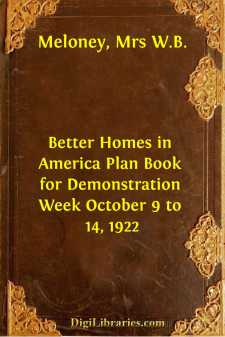Categories
- Antiques & Collectibles 13
- Architecture 36
- Art 48
- Bibles 22
- Biography & Autobiography 813
- Body, Mind & Spirit 142
- Business & Economics 28
- Children's Books 17
- Children's Fiction 14
- Computers 4
- Cooking 94
- Crafts & Hobbies 4
- Drama 346
- Education 46
- Family & Relationships 57
- Fiction 11829
- Games 19
- Gardening 17
- Health & Fitness 34
- History 1377
- House & Home 1
- Humor 147
- Juvenile Fiction 1873
- Juvenile Nonfiction 202
- Language Arts & Disciplines 88
- Law 16
- Literary Collections 686
- Literary Criticism 179
- Mathematics 13
- Medical 41
- Music 40
- Nature 179
- Non-Classifiable 1768
- Performing Arts 7
- Periodicals 1453
- Philosophy 64
- Photography 2
- Poetry 896
- Political Science 203
- Psychology 42
- Reference 154
- Religion 513
- Science 126
- Self-Help 84
- Social Science 81
- Sports & Recreation 34
- Study Aids 3
- Technology & Engineering 59
- Transportation 23
- Travel 463
- True Crime 29
Better Homes in America Plan Book for Demonstration Week October 9 to 14, 1922
by: Mrs W.B. Meloney
Description:
Excerpt
We spend too much time in longing for the things that are far off and too little in the enjoyment of the things that are near at hand. We live too much in dreams and too little in realities. We cherish too many impossible projects of setting worlds in order, which are bound to fail. We consider too little plans for putting our own households in order, which might easily be made to succeed. A large part of our seeming ills would be dispelled if we could but turn from the visionary to the practical. We need the influence of vision, we need the inspiring power of ideals, but all these are worthless unless they can be translated into positive actions.
The world has been through a great spiritual and moral awakening in these last few years. There are those who fear that this may all be dissipated. It will be unless it can be turned into something actual. In our own country conditions have developed which make this more than ever easy of accomplishment. It ought to be expressed not merely in official and public deeds, but in personal and private actions. It must come through a realization that the great things of life are not reserved for the enjoyment of a few, but are within the reach of all.
There are two shrines at which mankind has always worshipped, must always worship: the altar which represents religion, and the hearthstone which represents the home.
These are the product of fixed beliefs and fixed modes of living. They have not grown up by accident; they are the means, deliberate, mature, sanctified, by which the human race, in harmony with its own great nature, is developed and perfected. They are at once the source and the result of the inborn longing for what is completed, for what has that finality and security required to give to society the necessary element of stability.
The genius of America has long been directed to the construction of great highways and railroads, the erection of massive buildings for the promotion of trade and the transaction of public business. It has supplied hospitals, institutions of learning and places of religious worship. All of these are worthy of the great effort and the sustained purpose which alone has made them possible. They contribute to the general welfare of all the people, but they are all too detached, too remote; they do not make the necessary contribution of a feeling of proprietorship and ownership. They do not complete the circuit. They are for the people, but not of the people. They do not satisfy that longing which exists in every human breast to be able to say: "This is mine."
We believe in American institutions. We believe that they are justified by the light of reason, and by the result of experience. We believe in the right of self-government. We believe in the protection of the personal rights of life and liberty and the enjoyment of the rewards of industry. We believe in the right to acquire, to hold, and transmit property. We believe in all that which is represented under the general designation of a republic.
But while we hold that these principles are sound we do not claim that they have yet become fully established. We do not claim that our institutions are yet perfected.
It is of little avail to assert that there is an inherent right to own property unless there is an open opportunity that this right may be enjoyed in a fair degree by all. That which is referred to in such critical terms as capitalism cannot prevail unless it is adapted to the general requirements. Unless it be of the people it will cease to have a place under our institutions, even as slavery ceased.
It is time to demonstrate more effectively that property is of the people....


